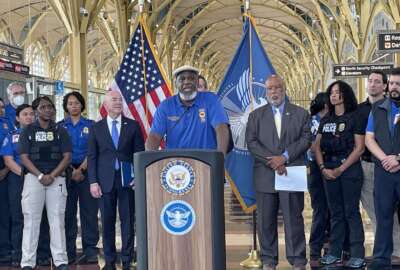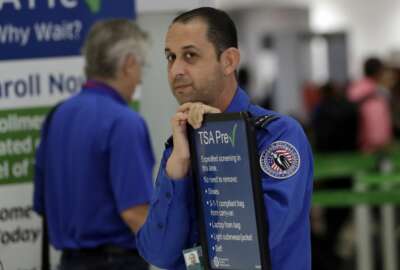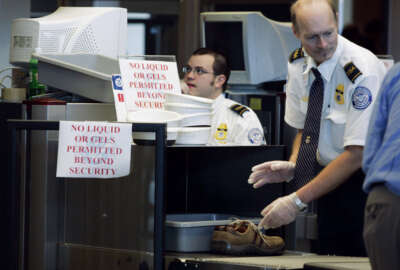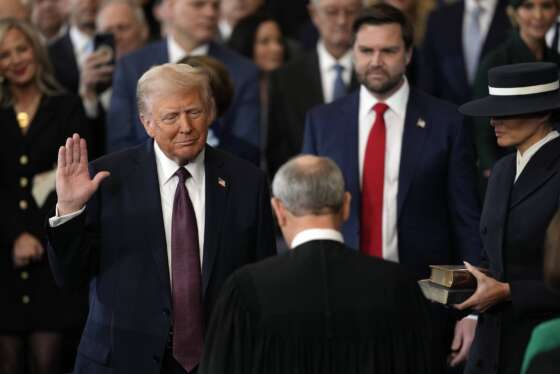TSA finally gets its pay raise: Here’s how we got here, and what comes next
After a historic pay raise, TSA is now working on an expanded collective bargaining agreement. We look at how we got to this point, and what comes next for airport...
The Transportation Security Administration pay raises last month represent a major milestone in a long-running push to bring TSA employees in line with the rest of the federal government’s pay and personnel system.
Now, TSA management and the American Federation of Government Employees are negotiating a collective bargaining agreement that would allow airport screeners to have a union contract similar to many other feds, rather than the limited agreement that’s in place now.
The progress for TSA employees over the last two years has been swift, but it follows more than a decade of efforts to address low morale and high attrition at what’s still one of the youngest federal agencies. And key initiatives like the collective bargaining agreement remain unfinished, while there’s concern Congress could strip back some of the pay raises in next year’s government spending bill.
“Pay fairness is an important milestone, but it is not a capstone,” Homeland Security Secretary Alejandro Mayorkas said last month during a press conference at Reagan National Airport to formally announce the TSA raises.
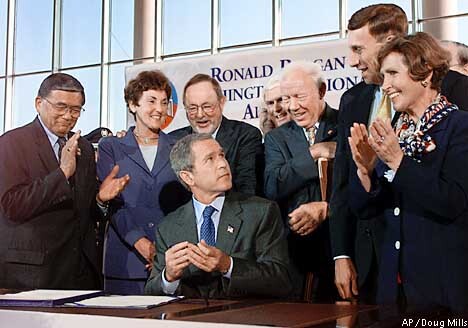
November 2001: President George W. Bush signs the Aviation and Transportation Security Act (ATSA), establishing the Transportation Security Administration. Before ATSA, airlines were responsible for passenger screening, and many of them contracted the security operations out to private firms. The law allows airport screeners to be federal employees, but exempts them from the Title 5 pay and personnel system used for most other federal jobs.
TSA’s establishment
The Department of Homeland Security is a collection of many federal agencies and offices that mostly existed before the 9/11 attacks, but were reorganized and brought under the auspices of DHS when it was established in 2003.
But TSA was largely built from scratch after it was established under the Aviation and Transportation Security Act of 2001. Before ATSA, airlines were responsible for passenger screening, and many of them contracted the security operations out to private firms.
The law gave way to the tens of thousands of new TSA airport screeners to be federal employees, but exempted them from the Title 5 pay and personnel system used for most other federal jobs.
“There was a history where we used to have what people call a ‘rent a cop’ doing the passenger screening,” House Homeland Security Committee Ranking Member Bennie Thompson (D-Miss.) said in an interview. “The mindset somehow was still there when TSA was put together that, ‘oh, this is just a menial, minimum wage type job.’”
“Well, real quick, it became clear that if we’re going to have passenger safety and security where we want it to be, we’re going to have to have professionals operating at the TSO level,” he continued. “Because they are the primary point of contact for every person who gets on a commercial airliner. And so over time, we made a lot of efforts to try to move it forward.”
One of the first such efforts nearly came to fruition in 2007, when the Senate passed a bill to approve collective bargaining for TSA screeners as part of legislation implementing recommendations from the 9/11 Commission.
“This part of the federal government suffers from incredible turnover,” then-Sen. Claire McCaskill (D-Mo.) said at the time. “It’s inefficient, it’s expensive and we’re not getting the kind of experienced screeners that will know what to look for … based on their experience.”
But that provision was stripped out of the final bill following a veto threat from President George W. Bush, keeping TSA employees under the separate pay and personnel system established by ATSA.
Limited collective bargaining
The following year, however, presidential candidate Barack Obama pledged to work with federal unions to ensure airport screeners could have workplace protections. After Obama was elected president, it didn’t take long for TSA to take that initial step.
In June 2011, TSA airport screeners chose the American Federation of Government Employees as their union after then-Administrator John Pistole agreed to grant screeners limited collective bargaining rights. Pistole’s determination allows TSA employees to negotiate over issues like shift bids, attendance management guidelines, and the performance management process.
Pistole had broad latitude under ATSA to determine the scope of the collective bargaining agreement. And, in an interview, he said he was concerned a fuller agreement could have led to the potential for airport screeners to go on strike.
“That was something that I did not believe was subject to collective bargaining at all,” Pistole said. “By being able to take that off, and then focusing on the things that were most important to the workforce — pay and benefits and shift schedules, all those things that any employee in that situation is interested in — we wanted to embrace that fully.”
Johnny Jones, secretary-treasurer for AFGE Council 100 and a 20-year TSA employee, said the union gave employees a venue to begin organizing and advocating for issues like increased pay.
“The union has been fighting for this since the beginning,” Jones said.
High attrition and long wait times
TSA continued to struggle with low morale and high attrition through the Obama administration, as pay continued to lag behind the rest of the federal workforce. The agency consistently ranked near the bottom of the Partnership for Public Service’s “Best Places to Work in the Federal Government” list, which is based on the Federal Employee Viewpoint Survey.
“Because of the way the promotion system worked, it would be literally three decades before you could get to the top of the main frontline screener pay band,” Thomas Warrick, a former DHS official and director of the “Future of DHS” project at the Atlantic Council, said in an interview. “And so this further exacerbated the turnover, the low morale.”
By 2015, Jones said stagnant wages at TSA forced many of his long-time colleagues to seek opportunities elsewhere. A hiring push at U.S. Citizenship and Immigration Services around that time led many TSA employees to apply there, Jones said, or at other agencies like Customs Border Protection.
And even new employees began seeing TSA as way to join the federal workforce before quickly moving on to another agency.
“The vast majority were just TSA was bringing them in, and then they were immediately being spoked out to another place,” Jones said.
Issues with TSA’s promotion system also began coming to light, as whistleblowers testified before Congress about “abuses of power” by senior management officials.
By 2016, the agency was in a “full-blown crisis,” with severe understaffing leading to long security lines at airports during peak travel season.
Retention continued to be a major challenge, especially for newer employees. One-quarter of the 8,000 Transportation Security Administration officers who left the agency in fiscal 2017 left within the first six months on the job, a DHS inspector general report found.
The push for pay equity
Mid-way through the Trump administration, the issue of low pay had risen to the surface as the primary driver of high turnover at TSA, with some airport screeners being paid as much as 30% less than their counterparts with similar experience at other federal agencies.
Warrick’s “Future of DHS” project at the Atlantic Council had identified pay as the primary culprit for TSA’s workforce issues, as did a 2019 blue ribbon panel report commissioned by TSA Administrator David Pekoske.
“It was completely apparent that problems with low pay were causing excessive turnover at TSA, and they were losing good people,” Warrick said. “As one of our experts put it, TSA was losing people to Amazon fulfillment centers, because you could make more money stuffing shoppers’ boxes then you could protecting our country’s aviation system and transportation systems.”
The Biden administration made it a priority to increase pay and workplace rights at TSA when, in June 2021, Mayorkas directed the agency to expand collective bargaining rights, negotiate a new contract with its union and develop a plan to pay the agency’s airport screeners General Schedule wages.
But the pay plan still had to be funded by Congress, while TSA was also requesting additional funds to manage an expanded collective bargaining arrangement. But by then, increasing airport screener pay had become largely a bipartisan issue.
Congress in the fiscal 2023 appropriations agreement passed last December included funding for the pay raises that began this past July, as well as money for TSA to hire staff to help manage collective bargaining.
Thompson, through his “Rights for TSOs Act” and other legislative efforts, is lauded as the member of Congress who led the push to increase pay for TSA employees. While TSA employees remain by statute under a separate pay and personnel system as the rest of the federal government, Thompson said he’s “cautiously optimistic” that can be achieved in the long run.
“At some point, you have to eat this elephant one bite at a time,” he said. “And so if my TSOs were given a choice, with the first bite being, ‘Pay me like you do all the federal employees’ I think almost to the person, they’ll take that. But that’s not the only bite.”
Collective bargaining and spending disagreements
In June, TSA and AFGE began hashing out the new collective bargaining agreement. It’s expected to be similar to the collective bargaining agreements in place at other agencies, which are governed by the Title 5 personnel system.
“It’s a fantastic increase in what we’re able to bargain over, and a great increase in what employees are finally able to have a say in when it comes to their terms and conditions of employment,” Chris Blessing, Legal Rights Attorney for AFGE, said in an interview.
Jones said some high priority topics for TSA employees include mandatory overtime, the shift bids process, and other things that affect “work-life” balance for airport screeners.
In an interview after last month’s pay raise press conference, Pekoske said TSA and its union counterparts have made “an awful lot of progress already” on the agreement.
“I would certainly like to get it done this calendar year, if at all possible,” he said. “And some things necessarily take a little bit longer, process-wise, but I would like to get there as quickly as we can.”
Pekoske — who has been administrator dating back to the Trump administration before he was re-nominated by Biden — has taken flak from Senate Republicans for supporting the Biden administration’s push for full collective bargaining at TSA.
Pekoske told lawmakers last year that TSA’s low Federal Employee Viewpoint Scores have convinced him that the agency needs a “different approach” to collective bargaining.
“My goal is to have a very good and productive relationship with the bargaining unit and the bargaining unit employees,” Pekoske told Federal News Network. “And that really begins in the negotiations for the collective bargaining agreement. So far, very positive, we’ve made a lot of progress. I’m hoping in the not too distant future, we’re able to sign something.”
Meanwhile, many of TSA’s pay and personnel plans remain subject to the annual appropriations process in Congress. When lawmakers get back from August recess, they will have a little less than a month to finalize the fiscal 2024 appropriations bills or fund the government using a continuing resolution.
The House Appropriations Committee’s version of the 2024 homeland security spending bill would prohibit the higher rates of pay at TSA from continuing for approximately 15,000 employees at the agency who aren’t airport screeners, including air marshals, canine handlers and cybersecurity experts.
The Senate Appropriations Committee’s version of the bill would maintain the pay raises for all employees into next year.
Pekoske has already pushed back against the House bill publicly. At the press conference late last month, Thompson acknowledged the appropriations process “in general” is “kind of difficult” this year, but vowed to ensure salaries won’t be stripped back.
“Over the next few months, we will be making sure that this is just not a one-off kind of thing,” Thompson said. “I’m not aware of any raise that’s been taken back from employees in our government. And we’ll make sure that that doesn’t happen in this situation.”
Nearly Useless Factoid
April 11, 1954 has been recorded as the most boring day in history.
Source: The Atlantic
Copyright © 2025 Federal News Network. All rights reserved. This website is not intended for users located within the European Economic Area.
Follow @jdoubledayWFED




